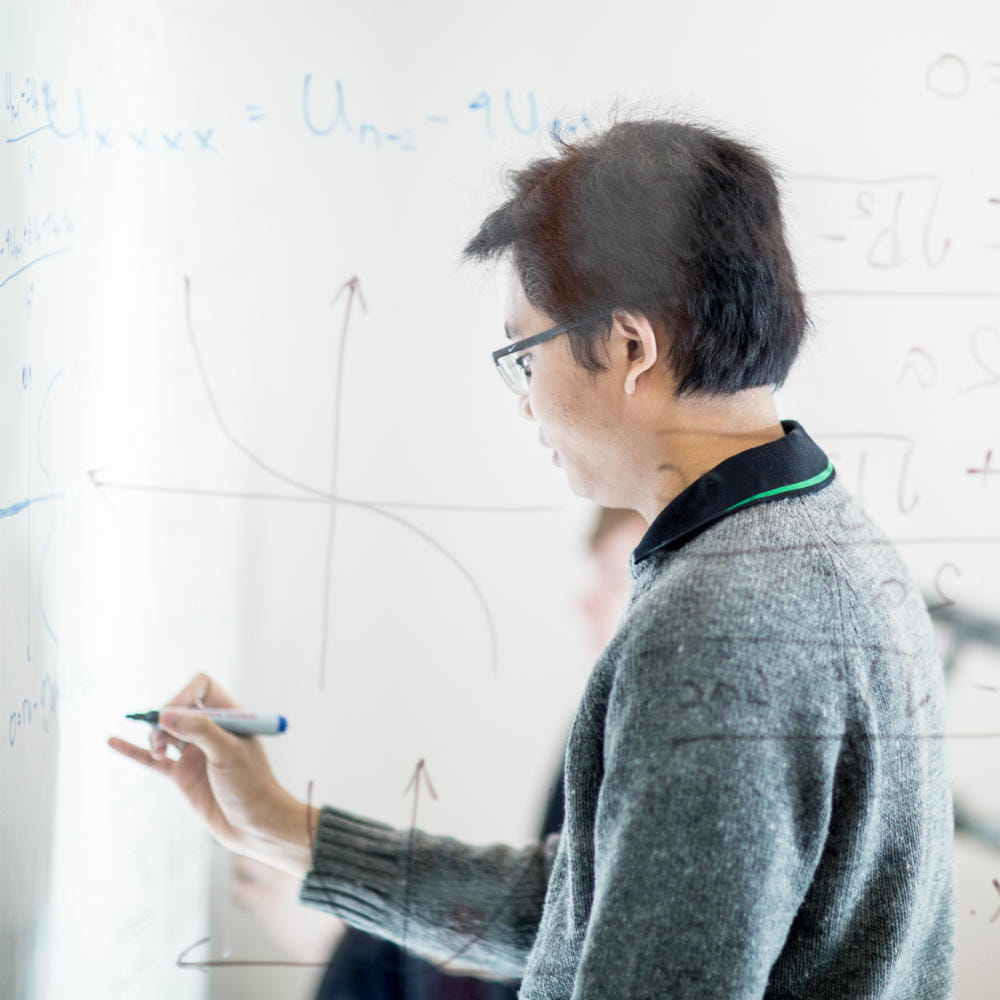Mathematics

Mathematics is an essential part of research in many other disciplines.
Our academics have links with research groups in other departments around the university, and work collaboratively on interdisciplinary projects with colleagues across the Faculty of Science and Health such as the Department of Psychology and the School of Computer Science and Electronic Engineering.
Mathematics research in our department covers three main areas: applied mathematics, pure mathematics, and mathematics education. Academics may have interests in more than one area, and some also carry out research within data science.
- Algebra, Geometry and Discrete Mathematics theme – The theme has expertise in algebraic geometry, commutative algebra, group and semigroup theory, graph theory and combinatorics, and applications to network coding. The theme runs an annual international workshop (AGGITatE) at the intersection of algebraic geometry and algebraic groups.
- Analysis and Mathematical Physics theme - Theme members work on a broad range of topics in Mathematical Analysis and Mathematical Physics, including discrete and continuous integrable systems, Lie groups, Lie algebras and symmetries, analysis of PDEs, Harmonic analysis and Potential theory, algebraic methods in differential equations, geometric analysis, Statistical Physics and Disordered Systems, Theoretical Physics, and Computational Physics. The theme members actively participate in the activities of the South East Mathematical Physics Seminars; LMS Harmonic Analysis and PDE Network; EPSRC Generalised and Low-Regularity Solutions of Nonlinear PDEs Network; Computational Physics Group of the Institute of Physics (IOP). The theme also runs an annual international workshop PDEs@Essex.
- Applied Mathematics - Theme members work on topics ranging from numerical mathematics and applications of linear algebra, through dynamical systems, mathematical modelling and mathematical biology. Specific topics include complex systems, network analysis, network inference, random walk theory, collective behaviour, population dynamics, pattern formation, Hamiltonian dynamics, dynamical systems, chaos theory and chaos prediction, low-rank tensor product approximations, linear and multilinear algebra, matrix analysis, and the design of efficient numerical algorithms.
- Mathematics Education theme - Researchers in this theme are dedicated to enhancing the teaching and learning of mathematics, particularly in post-16 and university education. A primary research direction seeks to improve the motivation of learners by studying growth mindsets and their influence on the mathematical learning process.

MESS (Mathematics Essex Seminar Series)
Throughout the academic year we run the Mathematics Essex Seminar Series. This series gives our staff and research students an opportunity to present and discuss their work with a diverse audience from around the University. We also invite mathematicians from other institutions across the world to present their research, helping raise awareness of research outside the university, and promoting inter-institutional collaboration.
Past events
Spring term 2022
- 24th March 2022 - Problem-solving Potential within the field of mathematics - Eabhnat Ní Fhloinn and Aidan Fitzsimons, Dublin City University.
- 17th March 2022 - Unboundedness of Markov complexity of monomial curves in for n ≥ 4 - Dimitra Kosta, University of Edinburgh.
- 10th March 2022 - Coupled Oscillator Networks: Structure, Interactions, and Dynamics - Christian Bick, University of Exeter.
- 3rd March 2022 - Hausdorff Dimension of Caloric Measure - Alyssa Genschaw, Milwaukee School of Engineering.
- 24th February 2022 - Nonlinear and dispersive waves in a basin - Dimitrios Mitsotakis, Victoria University of Wellington.
- 17th February 2022 - Quantitative unique continuation - Zihui Zhao, University of Chicago.
- 3rd February 2022 - Integrability and limit cycles in polynomial systems of ODEs - Valerij Romanovskij, University of Maribor.
- 27th January 2022 - Network Re-construction For The Complex Data Generated From The Discrete And Continuous Models - Huseyin Yildirim, University of Essex.
- 20th January 2022 - Localisation of energy in the FPUT- α system with variability and its chaotic behaviour - Zulkarnain Zulkarnain, University of Essex.
Autumn term 2021
- 16th December 2021 - GIT and K-stability for Fano varieties - Theodoros Papazachariou, University of Essex.
- 9th December 2021 - Morphing shapes: a guide to birational surgeries - Livia Campo, University of Birmingham/Saga University.
- 2nd December 2021 - Nonlinear and dispersive waves in a basin - Dimitrios Mitsotakis, Victoria University of Wellington.
- 25th November 2021 - -infinity functionalsLGeneralised vectorial infinity-eigenvalue nonlinear problems for - Nikos Katzourakis, University of Reading.
- 18th November 2021 - MCMC methods for sampling graphs with given degree constraints - Pieter Kleer, Tilburg University.
- 11th November 2021 - Discussing ethics with the mathematicians who need it most - Maurice Chiodo, University of Cambridge.
- 4th November 2021 - Strong unique continuation for heat operator with Hardy type potential - Agnid Banarjee, Tata Institute of Fundamental Research Bangalore.
- 28th October 2021 - Looking for ways of presenting knots which help artificial intelligence to learn to manipulate knots - Alexei Vernitski, University of Essex.
- 21st October 2021 - The many facets of Higgs bundles - Marina Logares, Universidad Complutense de Madrid.
- 14th October 2021 - Linear PDE with Constant Coefficients - Bernd Sturmfels, MPI Leipzig.
Our academics

Senior Lecturer in Mathematics
School of Mathematics, Statistics and Actuarial Science, University of EssexResearch areas: Analysis and Mathematical Physics.

Lecturer in Applied Mathematics
School of Mathematics, Statistics and Actuarial Science, University of EssexResearch area: Applied mathematics.

Lecturer in Mathematics
School of Mathematics, Statistics and Actuarial Science, University of EssexResearch areas: Algebra, Geometry, and Discrete Mathematics; Mathematics education.

Professor of Mathematical Biology
School of Mathematics, Statistics and Actuarial Science, University of EssexResearch area: Applied mathematics.

Reader in Applied Mathematics
School of Mathematics, Statistics and Actuarial Science, University of EssexResearch area: Analysis and Mathematical Physics; Applied Mathematics.

Lecturer
School of Mathematics, Statistics and Actuarial Science, University of EssexResearch area: Applied Mathematics.

Senior Lecturer in Applied Mathematics
School of Mathematics, Statistics and Actuarial Science, University of EssexResearch areas: Applied Mathematics; Analysis and Mathematical Physics.

Lecturer in Mathematics
School of Mathematics, Statistics and Actuarial Science, University of EssexResearch area: Algebra, Geometry, and Discrete Mathematics.

Senior Lecturer in Mathematics
School of Mathematics, Statistics and Actuarial Science, University of EssexResearch area: Algebra, Geometry, and Discrete Mathematics.

Senior Lecturer in Pure Mathematics
School of Mathematics, Statistics and Actuarial Science, University of EssexResearch area: Algebra, Geometry, and Discrete Mathematics.

Lecturer in Mathematics
School of Mathematics, Statistics and Actuarial Science, University of EssexResearch area: Analysis and Mathematical Physics.

Professor of Mathematics Education
School of Mathematics, Statistics and Actuarial Science, University of EssexResearch area: Mathematics education.

Lecturer in Mathematics
School of Mathematics, Statistics and Actuarial Science, University of EssexResearch area: Applied mathematics.

Senior Lecturer in Mathematics
School of Mathematics, Statistics and Actuarial Science, University of EssexResearch area: Algebra, Geometry, and Discrete Mathematics; Mathematics Education.

Lecturer
School of Mathematics, Statistics and Actuarial Science, University of EssexResearch area: Applied Mathematics.

Professor of Algebra
School of Mathematics, Statistics and Actuarial Science, University of EssexResearch area: Algebra, Geometry, and Discrete Mathematics.



